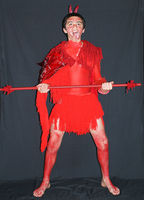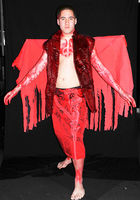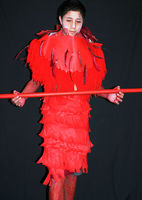 Hato Paora College students showed off their costumes in August as the first boys’ high school to take part in the Feilding Wearable Arts show.
Hato Paora College students showed off their costumes in August as the first boys’ high school to take part in the Feilding Wearable Arts show.
Six Year 10 students have helped to make their costumes from recycled materials and bits from the local op shop.
The boys chose ‘I See Red’ from four themes.
Hato Paora art teacher Tanu Aumua said the boys researched the symbolism of the colour red.
‘We also looked at past wearable art designs to give the boys a sense for the types of outfits they would be creating.
‘They’ve done a great job.’
 Zig Kennedy has spent the past 15 weeks designing, researching and creating his costume.
Zig Kennedy has spent the past 15 weeks designing, researching and creating his costume.
His piece was inspired by Tu, the Maori god of war – also known as Tumatauenga. ‘Because our theme was red, I thought red for love. So I chose the Maori god of war.
‘The hardest part was the bottom. I used two balls of yarn and ran out before I could finish it.’ Laani Lloyd appears as Maui in ‘Maui Tikitiki’ (above). ‘Our costume is based on the Māori myth of how Maui and his brothers slowed down the sun. The red represents the heat reflected off Maui and his clothes. It is also symbolic of the aroha (love), whanau (family) and kaha (strength) that united the brothers in order to get the job done.’
By designers Jerome Ratana and Zig Kennedy
Josh Fifita models Patupaiarehe (Phoenix), right. ‘Our design is based on the Patupaiarehe that protected our whānau when they returned from war at Gallipoli. The style of the dress coat is typical of the early 19th century. The poppy used on the costume refers to the Māori Battalion and the red represents those lost.’
By designers Terevarn Morgan and Josh Fifita
 Jarrod Flavell models Tanemahuta (god of the forest), left.
Jarrod Flavell models Tanemahuta (god of the forest), left.
‘We have developed our costume on the Māori god of the forest. To us Tanemahuta represents a spiritual presence in the forest that protects our native bush and wild life from developers who want to suck the land dry of its minerals. The colour evokes our genealogical connection to the land.’
By designers Arumaki Strickland and Soren Ahyou
Abuse case settled
Meanwhile the college has been instituting increased safety measures over the last three years in light of revelations of abuse in 2007 and the subsequent conviction of former principal Elvis Shepherd.
Board of Trustees Chairman Peter Douglas said Hato Paora is a safer school as a result of changes introduced since charges against Shepherd were laid. On Friday July 30, Shepherd was found guilty of sexually abusing students at an
Auckland school in the early 1990s and is currently in prison awaiting sentence.
Because of the court process, the school has been prevented from speaking publicly about the issue over the last three years including how the school has moved to improve safety for students.
‘We have not been able to discuss this until now. It is important that our community knows the Board has implemented preventative measures to reduce the chances of similar abuse from occurring. Staff and students are also now much more aware of their responsibilities in combating abuse,’ Mr Douglas said.
Thorough background checks, including police checks, are undertaken on all those applying for positions at the school. Applicants will follow strict requirements in regard to being open about previous work history. Other measures include shutting off all but one entrance to the school grounds and ensuring the school is aware of where staff, visitors and students are at any one time.
Mr Douglas said the Board has confidence in acting principal Debi Marshall-Lobb to institute agreed safety measures and to regularly review them to ensure their continual effectiveness, and thanked her for her tireless commitment to the school.
Hato Paora values excellence in education and upholds the ideals and aspirations of whanau and the wider Maori community.
‘We all have responsibility in protecting our boys and ensuring their safety as they navigate their teenage years, which can be a difficult and vulnerable time for many. We are a community that does not condone any abuse of children no matter by whom or what other good work they may have done.
‘I am pleased that we can now put the episode behind us and concentrate on a new generation of students at our college,’ Mr Douglas said.